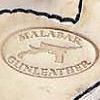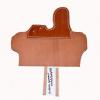-
Posts
446 -
Joined
-
Last visited
Content Type
Profiles
Forums
Events
Blogs
Gallery
Store
Everything posted by malabar
-
Yep. Pretty much. Sanding is key. The layers have to be flush, and without gaps at the edge. I round my edges right after I mold the holster. I have an Osbourne edger that I keep razor sharp, and it leaves a polished edge on the wet leather. When it dries, I re=wet the edge, rub it with glycerine saddle soap and burnish. Then I apply a tiny amount of wax (50% paraffin, 40% beeswax, 10% carnauba), and reburnish the edges. Comes up rounded and silky smooth.
-
I've got a Blackhawk G-17 and have used it to mold dozens of Glock Holsters. It's dimensions don't seem any different than my Ring's Glocks. tk
-
Have any of y'all ever used a hand-cranked embosser? If so, which model? Did it give professional results? Is one model preferable over another? many thanks tk
-

Bonding Double Layer Belts ?
malabar replied to Shooter McGavin's topic in Gun Holsters, Rifle Slings and Knife Sheathes
You laminate them to make them stiffer to support an OWB holster more effectively. Stiffer belts don't have to be tightened as much to support an OWB holster, so they end up being more comfortable. Lots of top-quality belts even have a stiffener running the length, sandwiched between the two layers of leather. tk -

Bonding Double Layer Belts ?
malabar replied to Shooter McGavin's topic in Gun Holsters, Rifle Slings and Knife Sheathes
I use one of these -- http://www.carpettool.net/349_cmyk.jpg They're heavy, the right width, and enable you to get a lot of pressure down on the belt. My belts are almost a quarter of an inch thick, so you've really got to press on them . tk -

Sight Channel
malabar replied to charlescrawford's topic in Gun Holsters, Rifle Slings and Knife Sheathes
my pleasure.- 18 replies
-

Reinforcing Band At Top Of Holster
malabar replied to jforwel's topic in Gun Holsters, Rifle Slings and Knife Sheathes
Yep. Sew it flat, then bend it into shape. Take a look at the note I posted about sight tracks and it shows how I do it. tk -

Sight Channel
malabar replied to charlescrawford's topic in Gun Holsters, Rifle Slings and Knife Sheathes
As promised, here are some photos that illustrate how I do a stitched-in sight channel..... I only use this on one model, a variation on the Summer Special design. It uses very light leather and the stitched-in sight channel holds up better than the molded sight channel. The first picture shows how the finished stitched-in strips work...... The second shows the templates I use to cut out the pieces of leather.... Here are the pieces of leather (minus the straps) ready to go. This shows how the steel band goes into the leather guard. The next photo shows the exterior of the holster after the guard has been stitched on. The next photo shows the interior of the holster as the lines are laid out for the strips that will form the sight track. The strips are about a quarter-inch wide, and made of heavy 12-ounce leather. Glue the strip in place. Then run a single line of stitching down each strip. Fold it around into final form, and stitch together. Voila! tk- 18 replies
-

Sight Channel
malabar replied to charlescrawford's topic in Gun Holsters, Rifle Slings and Knife Sheathes
As a matter of fact, that's what I use. Have had to make some more elaborate ones out of thin wood stock for some revolvers, though. tk- 18 replies
-

Sight Channel
malabar replied to charlescrawford's topic in Gun Holsters, Rifle Slings and Knife Sheathes
Be happy to, but I never took photos of the construction. Let me see if I can get one made tonight....- 18 replies
-
Sorry, can't see it tk
-

Belt Slot Punch?
malabar replied to MStarmer's topic in Gun Holsters, Rifle Slings and Knife Sheathes
The black ones are the stuff that tandy sells. I hate to say this, but you should avoid them at all costs. I bought one from a local Tandy and the edge didn't hold up at all. The manager of the place told me that if I was going to do any kind of volume I needed to buy Osborne (which they didn't sell). I ended up buying most of my strap-end cutters and bag punches from Osborne. They're a few bucks more but the quality is much higher. tk -

Sight Channel
malabar replied to charlescrawford's topic in Gun Holsters, Rifle Slings and Knife Sheathes
There are basically two ways to do the sight channels: Tape in a piece of wood along the top rail and mold it, or stitch it in. The only time I use a stitched sight channel is on a summer special type holster. http://www.malabargu...-summer-special- 18 replies
-

New One For My Mk9
malabar replied to jlaudio29's topic in Gun Holsters, Rifle Slings and Knife Sheathes
very nicely executed! tk -

Need Black Ostrich
malabar replied to camano ridge's topic in Gun Holsters, Rifle Slings and Knife Sheathes
I get mine from this guy ... http://www.ostrichmarket.com/ he's local tk -

Questions About Design And Balance...
malabar replied to CAVE's topic in Gun Holsters, Rifle Slings and Knife Sheathes
Cave, Fundamentally, holsters are very simple items -- just a couple of pieces of leather folded and sewn together. But as you suggest, the difference between a great holster and a crappy holster can often be in details that are hard for the uninitiated to discern. There aren't necessarily pat answer to some of the questions you're asking. Understanding how those elements work together is part of your development as a holstermaker. There are a a lot of elements that go into the making of a first-rate concealment holster. As a firearms instructor, one of my gripes is that students often train one way (1911 in a 3-oclock, strong side presentation, drop-holster), and carry an entirely different way (Ruger LC9 in a behind-the-hip IWB). This is really counter productive, because all the skills and muscle-memory they build up runs counter to their daily practice. A good concealment holster should be designed from the very start for a particular type of presentation and a particular location on the belt. Many can be moved around, but they are generally ideal in only a limited range of locations. The FBI was the group most responsible for requiring significant cant in a holstered pistol, thinking that the cant made it faster to bring the gun onto target. This is pretty much an outmoded concept today. The growth of action shooting sports and tactical police teams has led widespread acceptance of a vertical draw and punch-out technique. If you can get a copy of the NRA's guide to Personal Protection in the Home, it's really well-explained there. Leather thickness plays a major role in how the holster works, but even more so, the "tempering" of the leather is critical. There are folks who sell sell leather holsters that are hardened like kydex, and folks who sell holsters that are as soft as limp noodles. Most are somewhere in between -- but the hardness of the holster is a critical part of the overall design. A high ride on the belt is chiefly a feature of concealment holsters -- it brings the pistol into the hollow of the body. This also aids with retention. This is my take on the elements of a good holster... http://www.malabargunleather.com/which-holster Other might have different ideas, but I've seen several of the oldtimers around here espouse similar ideas. tk -

Prototype Western Holster
malabar replied to Lobo's topic in Gun Holsters, Rifle Slings and Knife Sheathes
I really like the concept and have been mulling something similar for a wildbunch rig I'm working up. You know what would be a slick addition? If you could make the attachment loop interchangeable as well. Why? Well, then you could make the the drop height and cant adjustable. tk -

Questions About Design And Balance...
malabar replied to CAVE's topic in Gun Holsters, Rifle Slings and Knife Sheathes
You can certainly make high-ride holsters -- most of mine ride a good 3/4-1-inch higher than the average pancake -- but you must design the holster so that t has the structural strength to ride up there without "bouncing." For example, the back on my high-ride pancake holster is laminated out of two layers of (fairly thick) leather. That gives the holster the stiffness it needs to ride high, like this... http://www.malabargunleather.com/holsters/high-ride BTW: It sure looks like you have a lot of forward cant on the pistol. That's kind of counterproductive for the vertical draw technique that is taught at most places today. tk -

Shoulder Holster
malabar replied to artycpt's topic in Gun Holsters, Rifle Slings and Knife Sheathes
The harness is unusual -- could you tell us a little about it? -

Double Shoulder Holster Rig
malabar replied to Lobo's topic in Gun Holsters, Rifle Slings and Knife Sheathes
Very nice work -- as always. tk -

Lining Compared To Burnishing
malabar replied to glockanator's topic in Gun Holsters, Rifle Slings and Knife Sheathes
I treat the inside of all of my unlined holsters with Fiebings Aussie Leather Conditioner. It's a non-penetrating, beeswax-based product that seal and smooths the fleshy side of the leather and creates a kinder surface. Simple and easy to apply -- smear it on, rub it in a bit, you're done with it. -

Lining Compared To Burnishing
malabar replied to glockanator's topic in Gun Holsters, Rifle Slings and Knife Sheathes
I only line holsters if there is a specific reason to do so -- at the customer's request, or because the holster body is chrome-tanned, or because the holster body needs more strength.










